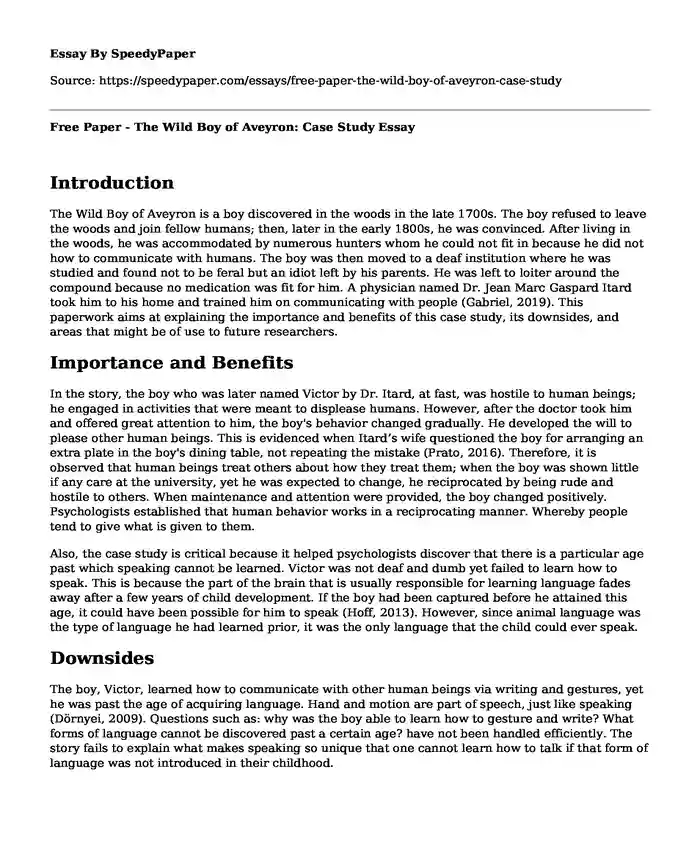
| Type of paper: | Essay |
| Categories: | Psychology Languages |
| Pages: | 3 |
| Wordcount: | 691 words |
Introduction
The Wild Boy of Aveyron is a boy discovered in the woods in the late 1700s. The boy refused to leave the woods and join fellow humans; then, later in the early 1800s, he was convinced. After living in the woods, he was accommodated by numerous hunters whom he could not fit in because he did not how to communicate with humans. The boy was then moved to a deaf institution where he was studied and found not to be feral but an idiot left by his parents. He was left to loiter around the compound because no medication was fit for him. A physician named Dr. Jean Marc Gaspard Itard took him to his home and trained him on communicating with people (Gabriel, 2019). This paperwork aims at explaining the importance and benefits of this case study, its downsides, and areas that might be of use to future researchers.
Importance and Benefits
In the story, the boy who was later named Victor by Dr. Itard, at fast, was hostile to human beings; he engaged in activities that were meant to displease humans. However, after the doctor took him and offered great attention to him, the boy's behavior changed gradually. He developed the will to please other human beings. This is evidenced when Itard’s wife questioned the boy for arranging an extra plate in the boy's dining table, not repeating the mistake (Prato, 2016). Therefore, it is observed that human beings treat others about how they treat them; when the boy was shown little if any care at the university, yet he was expected to change, he reciprocated by being rude and hostile to others. When maintenance and attention were provided, the boy changed positively. Psychologists established that human behavior works in a reciprocating manner. Whereby people tend to give what is given to them.
Also, the case study is critical because it helped psychologists discover that there is a particular age past which speaking cannot be learned. Victor was not deaf and dumb yet failed to learn how to speak. This is because the part of the brain that is usually responsible for learning language fades away after a few years of child development. If the boy had been captured before he attained this age, it could have been possible for him to speak (Hoff, 2013). However, since animal language was the type of language he had learned prior, it was the only language that the child could ever speak.
Downsides
The boy, Victor, learned how to communicate with other human beings via writing and gestures, yet he was past the age of acquiring language. Hand and motion are part of speech, just like speaking (Dörnyei, 2009). Questions such as: why was the boy able to learn how to gesture and write? What forms of language cannot be discovered past a certain age? have not been handled efficiently. The story fails to explain what makes speaking so unique that one cannot learn how to talk if that form of language was not introduced in their childhood.
Areas That Might Be of Benefit to Future Researches
Researchers need to expound more on the part of the brain that is responsible for language acquisition. It is essential to learn how its effectiveness can be increased to last longer, maybe up to adulthood, so that in the future, children like Victor can be at an advantage. Research on what exactly makes it fade away needs to be established so that, for example, if it is due to the diminishing of certain hormones in the body, research on how to increase those hormones in the body can be conducted (Hoff, 2013)—thus extending the age limit at which human beings can learn how to speak.
References
Dörnyei, Z. (2009). The psychology of second language acquisition. Oxford: Oxford University Press.
Gabriel, Y. (2019). Case studies as narratives: Reflections prompted by the case of Victor, the wild child of Aveyron. Journal of Management Inquiry, 28(4), 403-408.
Hoff, E. (2013). Language development. Cengage Learning.
Prato, A. (2016). A Special Case of Philosophical Reflection about the Origin of language: Victor, the Wild Child of Aveyron. Theoria et Historia Scientiarum, 13, 55-70.
Cite this page
Free Paper - The Wild Boy of Aveyron: Case Study. (2024, Jan 02). Retrieved from https://speedypaper.net/essays/free-paper-the-wild-boy-of-aveyron-case-study
Request Removal
If you are the original author of this essay and no longer wish to have it published on the SpeedyPaper website, please click below to request its removal:
- Alcohol, Nothing Less Than a Curse. Essay Example.
- Job Satisfaction - Articles Review Paper Sample
- Essay Sample on Psychoeducation for Early Intervention
- How English Can Influence a Student's Future Career - Essay Sample
- Acid/Base Extraction. Essay Example
- Essay Example on Unveiling the Paths of Learning: Humanism vs. Behaviorism in Education
- Compare and Contrast on Virtual Vs. Face-to-Face Classes - Paper Example
Popular categories




